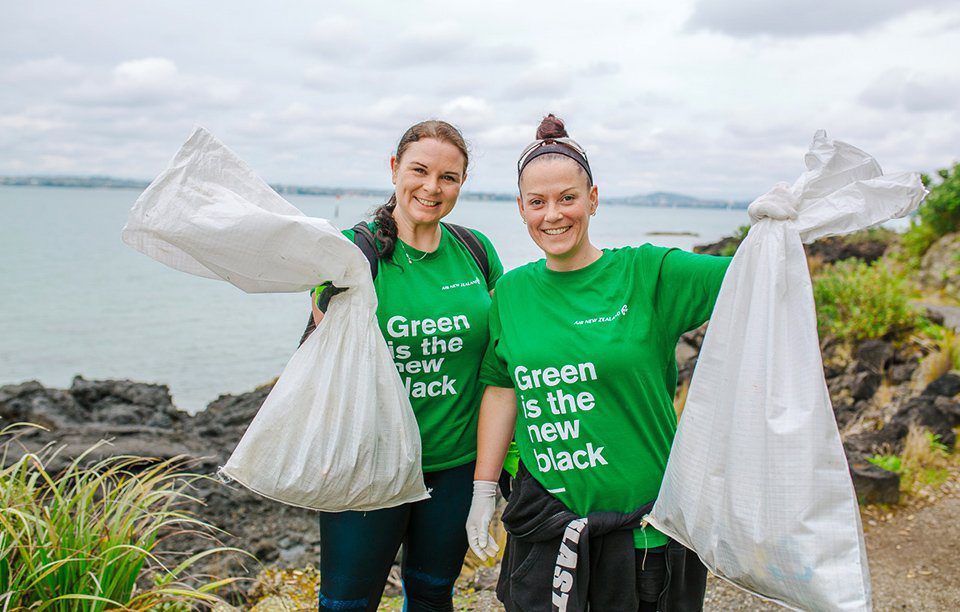AIR NEW ZEALAND IS ELIMINATING NEARLY 55 MILLION SINGLE-USE PLASTIC ITEMS FROM ITS FLIGHTS.
The race it seems has finally begun for airlines to start to combat the incessant amount of single-use plastics used on flights all over the world.
Both Qantas and Etihad Airways have recently flown waste reduced flights in a bid to show a commitment to change when it comes to eliminating single-use plastics and overall onboard waste.
Air New Zealand is notching up ‘Plastic Free July’ as a positive milestone to further reduce its carbon footprint by doubling its reduction of single-use plastic items from 24 million items to nearly 55 million this year.
The plastic-free initiative began in late 2018 with water cups, coffee cups and lids, and cheese plates the first items to be phased out for “lower-impact alternatives”.
What’s the challenge?
Universal aviation single-use plastic issue aside, a previous report by Stuff revealed that Air New Zealand is actually one of the country’s largest climate polluters and responsible for emitting 3.5 million tonnes of carbon dioxide every year.
Furthermore, the airline noted that its carbon footprint has continued to grow each year. For instance, in 2018 emissions were 700,000 times higher than in 2011.
What’s the solution?
During the month of July, the airline will remove individual plastic water bottles and other items for good.
The airline is also set to roll out coffee cups made from plants rather than plastic across its domestic and international networks from October, while plastic water cups will be transitioned to recyclable alternatives from September.
The previous commitment targeted coffee and water cups on Air New Zealand’s domestic network where the majority of cups are used, however, the scope has now expanded to introduce the lower impact cups across the international network, lifting the total number of cups being replaced this year from 14.7 million to 44.5 million.
The move is expected to save more than 460,000 bottles from going into landfills and reduce carbon emissions by over 300,000 kg. Later this year, eco-friendly alternatives that include recyclable water cups and compostable coffee cups will also be added to lighten the load across the fleet.

Air NZ’s acting head of sustainability, Anna Palairet says:
“Single-use plastic is a highly topical and visible issue for us and our customers, so we’re really pleased to be able to share this progress to celebrate Plastic Free July. The lack of composting infrastructure available in New Zealand is a challenge so we have been focused on reducing the amount of single-use plastic products we purchase in the first place.
“It’s great to see more and more customers are bringing their reusable drink bottles and keep cups on board, and we encourage people to do this – our cabin crew team is happy to fill these.”
What will the positive impact be?
By October 2019, the airline will have avoided 29 million plastic cups, 15.5 million coffee cups and lids, 1.5 million plastic bags, 550,000 cheese trays, and 200,000 sauce packets. Which is a definite step in the right direction.
Air New Zealand also continues its ongoing carbon offsetting program launched in 2016: “Our goal is for Air New Zealand to stabilise emissions through carbon-neutral growth post-2020, in a way that simultaneously drives significant environmental, social and economic benefits.”
Air New Zealand flew one of the aviation industry’s first biofuel test flights back in 2008, using a jatropha-derived second-generation biofuel, which proved the technical feasibility of using alternative fuels. The test flight also provided supporting data to the subsequent (ASTM) certification of plant-based biofuels for commercial airline operations.
Find out more in the Carbon section of Air New Zealand’s 2018 Sustainability Report.
How can you travel to change the world?
Congratulations! By reading this post and taking some of these insights on board, you’ve already made a difference.
Now you can easily create your impact by sharing your new-found knowledge with other friends who you think would also be interested.
Ultimately, responsible travel comes down to common sense – stay curious, keep yourself up-to-date with the challenges at hand and make yourself accountable for your actions on your travels.